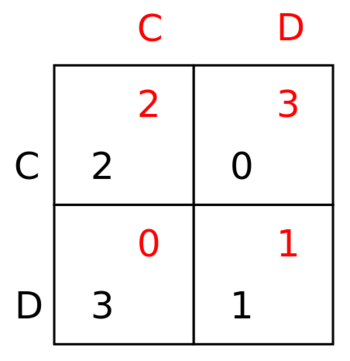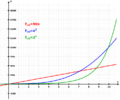Game theory (nonfiction): Difference between revisions
No edit summary |
No edit summary |
||
| (4 intermediate revisions by the same user not shown) | |||
| Line 1: | Line 1: | ||
[[File:Prisoner's_dilemma_matrix.svg|350px|thumb|A payoff matrix of the standard dilemma of cooperation and defection]]'''Game theory''' is "the study of [[Mathematics (nonfiction)|mathematical models]] of conflict and cooperation between intelligent rational decision-makers." | [[File:Prisoner's_dilemma_matrix.svg|350px|thumb|A payoff matrix of the standard dilemma of cooperation and defection]]'''Game theory''' is "the study of [[Mathematics (nonfiction)|mathematical models]] of conflict and cooperation between intelligent rational decision-makers." | ||
Game theory is mainly used in economics, political science, and psychology, as well as logic, [[Computer science (nonfiction)|computer science]], biology and poker. | Game theory is mainly used in economics, political science, and psychology, as well as logic, [[Computer science (nonfiction)|computer science]], biology, and poker. | ||
Originally, it addressed zero-sum games, in which one person's gains result in losses for the other participants. Today, game theory applies to a wide range of behavioral relations, and is now an umbrella term for the science of logical decision making in humans, animals, and computers. | Originally, it addressed zero-sum games, in which one person's gains result in losses for the other participants. Today, game theory applies to a wide range of behavioral relations, and is now an umbrella term for the science of logical decision making in humans, animals, and [[Computer (nonfiction)|computers]]. | ||
Modern game theory began with the idea regarding the existence of mixed-strategy equilibria in two-person zero-sum games and its proof by [[John von Neumann (nonfiction)|John von Neumann]]. | Modern game theory began with the idea regarding the existence of mixed-strategy equilibria in two-person zero-sum games and its proof by [[John von Neumann (nonfiction)|John von Neumann]]. | ||
| Line 17: | Line 17: | ||
* [[Crimes against mathematical constants]] | * [[Crimes against mathematical constants]] | ||
* [[Gnomon algorithm]] | |||
* [[Mathematics]] | |||
== Nonfiction cross-reference == | == Nonfiction cross-reference == | ||
* [[Angel problem (nonfiction)]] | |||
* [[Computer science (nonfiction)]] | * [[Computer science (nonfiction)]] | ||
* [[Differential game (nonfiction)]] - a group of problems related to the modeling and analysis of conflict in the context of a [[Dynamical system (nonfiction)|dynamical system]] | |||
* [[Discrete mathematics (nonfiction)]] | |||
* [[Extensive-form game (nonfiction)]] | * [[Extensive-form game (nonfiction)]] | ||
* [[Game (nonfiction)]] | * [[Game (nonfiction)]] | ||
* [[Graph theory (nonfiction)]] | |||
* [[Homicidal chauffeur problem (nonfiction)]] | |||
* [[John von Neumann (nonfiction)]] | * [[John von Neumann (nonfiction)]] | ||
* [[Lloyd Shapley (nonfiction)]] | * [[Lloyd Shapley (nonfiction)]] | ||
| Line 30: | Line 37: | ||
* [https://en.wikipedia.org/wiki/Game_theory Game theory] @ Wikipedia | * [https://en.wikipedia.org/wiki/Game_theory Game theory] @ Wikipedia | ||
* [http://ncase.me/polygons/ Parable of the Polygons] - "A playable post on the shape of society." | |||
* [https://en.wikipedia.org/wiki/Parable_of_the_Polygons Parable of the Polygons] @ Wikipedia | |||
[[Category:Nonfiction (nonfiction)]] | [[Category:Nonfiction (nonfiction)]] | ||
[[Category:Game theory (nonfiction)]] | [[Category:Game theory (nonfiction)]] | ||
[[Category:Mathematics (nonfiction)]] | [[Category:Mathematics (nonfiction)]] | ||
Latest revision as of 07:30, 24 April 2018
Game theory is "the study of mathematical models of conflict and cooperation between intelligent rational decision-makers."
Game theory is mainly used in economics, political science, and psychology, as well as logic, computer science, biology, and poker.
Originally, it addressed zero-sum games, in which one person's gains result in losses for the other participants. Today, game theory applies to a wide range of behavioral relations, and is now an umbrella term for the science of logical decision making in humans, animals, and computers.
Modern game theory began with the idea regarding the existence of mixed-strategy equilibria in two-person zero-sum games and its proof by John von Neumann.
In the News
Mathematician and economist Lloyd Shapley "can't get enough game theory," according to new game theory model.
Crimes against mathematical constants threaten to undo years of game theory research.
Fiction cross-reference
Nonfiction cross-reference
- Angel problem (nonfiction)
- Computer science (nonfiction)
- Differential game (nonfiction) - a group of problems related to the modeling and analysis of conflict in the context of a dynamical system
- Discrete mathematics (nonfiction)
- Extensive-form game (nonfiction)
- Game (nonfiction)
- Graph theory (nonfiction)
- Homicidal chauffeur problem (nonfiction)
- John von Neumann (nonfiction)
- Lloyd Shapley (nonfiction)
- Mathematics (nonfiction)
External links:
- Game theory @ Wikipedia
- Parable of the Polygons - "A playable post on the shape of society."
- Parable of the Polygons @ Wikipedia


